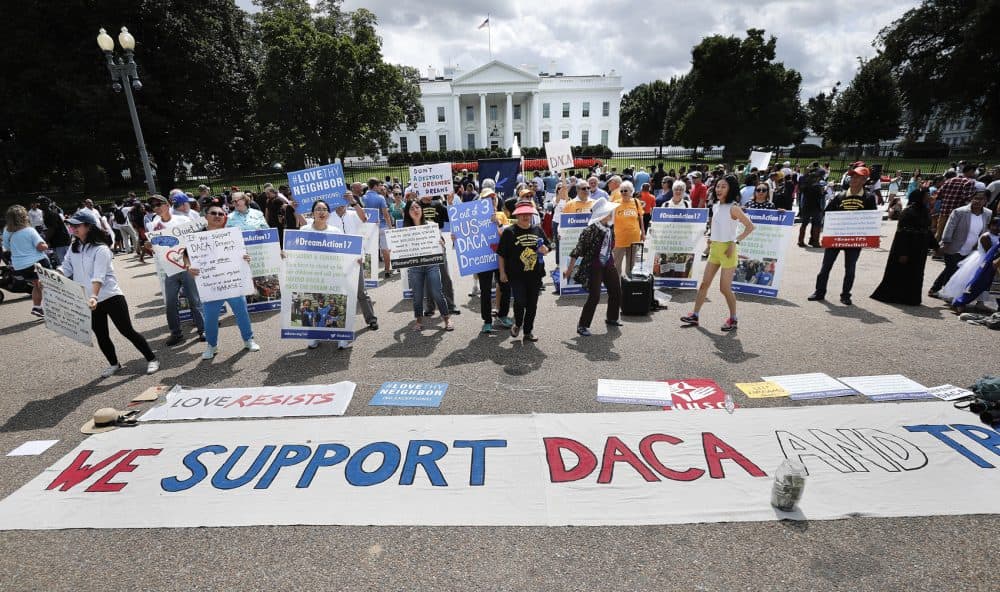Advertisement
Trump's Decision On Young Immigrants Could Begin GOP Battle

President Trump's plan to take a hard line on young immigrants unless Congress intervenes threatens to expose deep divides among Republicans who have long struggled with the issue, with one conservative warning of a potential "civil war" within the party.
Trump's attorney general, Jeff Sessions, is expected to announce Tuesday that the administration will end in six months a program that shields from deportation young immigrants brought to the country illegally as children. The immigrants are often referred to as "Dreamers."
According to two people familiar with Trump's decision, the decision to delay by six months the termination of the Deferred Action for Childhood Arrivals, or DACA, would give Congress time to act. The people spoke on condition of anonymity because they were not authorized to discuss details publicly.
But that plan also hands a political hot potato to congressional Republicans, who have a long history of failing to act on immigration because of divisions in the party.
Rep. Ileana Ros-Lehtinen, R-Fla., tweeted: "After teasing #Dreamers for months with talk of his `great heart,' @POTUS slams door on them. Some `heart'.."
Trump's decision would come after a long and notably public deliberation. Despite campaigning as an immigration hard-liner, Trump has said he is sympathetic to the plight of the immigrants who came to the U.S. illegally as children and in some cases have no memories of the countries they were born in.
But such an approach - essentially kicking the can down the road and letting Congress deal with it- is fraught with uncertainty and political perils that amount, according to one vocal opponent, to "Republican suicide."
Still other Republicans say they are ready to take on a topic that has proven a non-starter and career-breaker for decades.
"If President Trump makes this decision we will work to find a legislative solution to their dilemma," said Republican Sen. Lindsay Graham.
Officials caution that Trump's plan is not yet finalized, and the president, who has been grappling with the issue for months, has been known to change his mind at the last minute ahead of an announcement. It also remains unclear exactly how a six-month delay would work in practice, including whether the government would continue to process applications under the program, which has given nearly 800,000 young immigrants a reprieve from deportation and the ability to work legally in the country in the form of two-year, renewable permits.
The Obama administration created the DACA program in 2012 as a stopgap as they pushed unsuccessfully for a broader immigration overhaul in Congress. Many Republicans say they opposed the program on the grounds that it was executive overreach.
House Speaker Paul Ryan and a handful of other Republicans urged Trump last week to hold off on scrapping DACA to give lawmakers time to come up with a legislative fix.
But Congress has repeatedly tried - and failed - to come together on immigration overhaul legislation, and it remains uncertain whether the House would succeed in passing anything on the divisive topic.
One bill addressing the issue that has received the most attention, introduced by Sens. Graham, R-S.C., and Dick Durbin, D-Ill., would grant permanent legal status to more than 1 million young people who arrived in the United States before they turned 18, passed security checks and met other criteria, including enrolling in college, joining the military or finding jobs.
It's unclear, however, whether the president would throw his support behind that or any other existing legislation. He could encourage the writing of a new bill - tied, perhaps, to funding for his promised border wall or other concessions like a reduction in legal immigration levels.
But it's unclear how much political capital the president would want to put on the line given his base's strong opposition to illegal immigration, his campaign rhetoric blasting DACA as illegal "amnesty" and his reluctance to campaign hard for other priorities, like health care overhaul.
Graham said in a statement Monday that he would support the president if he decided ultimately to go through with the plan as outlined.
"I have always believed DACA was a presidential overreach. However, I equally understand the plight of the Dream Act kids who - for all practical purposes - know no country other than America," Graham said in a statement.
Sen. James Lankford, R-Okla., agreed, saying that it should be up to Congress, not the White House, to set immigration policy.
"We must confront the nation's out-of-date immigration policy and finally resolve the issues of strong border enforcement and merit immigration," he said. "It is right for there to be consequences for those who intentionally entered this country illegally. However, we as Americans do not hold children legally accountable for the actions of their parents."
But Rep. Steve King, an Iowa Republican who believes that DACA is unconstitutional, warned that pushing the decision to Congress would be a big mistake.
"That would cause a great big civil war among the Republicans," he said last week. "We've got enough of never-Trumpers in Congress that are undermining the president's agenda."
He added on Twitter late Sunday night: "Ending DACA now gives chance 2 restore Rule of Law. Delaying so R Leadership can push Amnesty is Republican suicide."
Associated Press writers Catherine Lucey and Erica Werner contributed to this report.